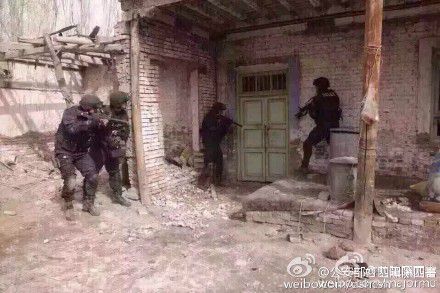| Online: | |
| Visits: | |
| Stories: |

| Story Views | |
| Now: | |
| Last Hour: | |
| Last 24 Hours: | |
| Total: | |
The Far-reaching Consequences of the Paris and Beirut Bombings
Photo from the deleted Weibo posts, via Quartz
The coordinated series of bombings and shootings by the Islamic State (IS) on Friday the 13th which killed 129 people in Paris and 43 people in Beirut the day before, will have long-reaching repercussions on the domestic and foreign policies of many nations. Already, talk is growing of closing borders across Europe and 19 U.S. governors have indicated they will refuse any Syrians planning to seek refuge in their states. France reacted militarily by launching punitive airstrikes against IS in Syria on Sunday night, and the U.S. conducted airstrikes against IS and its oil smuggling network. Numerous raids on suspected Islamic terrorists were conducted across France and are also underway in Brussels.
Over in China’s far western autonomous province of Xinjiang, the attacks in Paris and Beirut will probably result in a green light from Beijing for local officials to step up their crackdown against the Islamic militant threat. Following the attacks, Chinese Foreign Minister Wang Yi reportedly called for Xinjiang to become an “important part” of the world’s war on terror, calling for a “united front to combat terrorism.” Minister Wang was also reported saying, “China is also a victim of terrorism. The fight against the ‘East Turkestan Islamic Movement’… should become an important part of the international fight against terrorism.”
The momentum for increased counterinsurgency efforts in China is clearly building, and efforts to get the Chinese public on board, using propaganda, in the fight against terrorism will increase. On the day following the Paris attacks, the state-owned People’s Daily ran an article (since removed) covering a counterinsurgency effort to combat terrorist militants in Xinjiang. The article was accompanied by several pictures of armed police in mountainous areas, some preparing to raid a rural home (as shown above).
Xinjiang is the Chinese province which has witnessed the greatest number of terrorist actions, with hundreds killed, although recent attacks have spread across China to include Beijing, Kunming and Guangzhou. Beijing blames these attacks on Islamic terrorists, often pointing the finger at the East Turkestan Islamic Movement (ETIM), a group it claims has links with al Qaeda.
Beijing claims ETIM is fighting for an independent state called “East Turkestan,” or “Uyghuristan” modeled after neighboring Central Asian nations. Two “Eastern Turkestan Republics” survived between 1931-1934 and 1944-1949 before Mao Zedong took control and eventually conceded the title “Xinjiang Autonomous Region” in 1955, partly to win over Turkic speakers in the territory. Beijing also asserts some 300 of Xinjiang’s ethnic Uighur population have traveled to Syria and Iraq to fight alongside IS.
Despite ETIM having been placed by the U.N. and Washington on a list of terror organizations in the aftermath of the September 11 attacks, many foreign experts doubt the portrayal by Beijing of ETIM as a formidable force. Rather, human rights organizations and the exile community argue the violence can be traced to the widespread resentment among Uighurs to strict controls on the practice of their religion and efforts to eradicate their culture.
These efforts have included the banning of veils for women, imposing restrictions on Uighur travel rights, banning students from fasting during Ramadan, restricting religious teaching for children, and putting limits on Uighur-language education. Analysts also point to widespread discrimination against Uighurs in hiring and other economic opportunities.
Back in September 2014, China’s highest court, highest prosecution office and the Ministry of Public Security jointly issued detailed instructions on dealing with terrorism and religious extremism. The instructions urged court officials, prosecutors and police to distinguish between the illegal acts of religious extremists and ordinary religious activities, urging officials to avoid discriminating against any religion or ethnic minority, and to avoid interfering with citizens’ freedom to practice their religion.
In the aftermath of the attacks in Paris, government officials in Xinjiang will be tempted to put aside these restraints on their policing, and any excessive actions against the Uighur population will likely be overlooked by Beijing. The rhetoric coming from China’s top police chief, Public Security Minister Guo Shengkun, “to smash violent terrorism before it occurs,” sets a dangerous precedent. Beijing is certainly justified in stepping up efforts to counter any real terrorist threats in the aftermath of the Paris and Beirut attacks, as many nations are doing. Yet greater efforts will need to be undertaken to promote smarter policing in Xinjiang, as also advocated by Guo, lest the rights of the innocent be further infringed upon in the name of expediency.
Source: http://foreignpolicyblogs.com/2015/11/17/the-far-reaching-consequences-of-the-paris-and-beirut-bombings/




